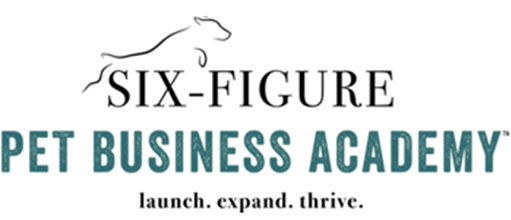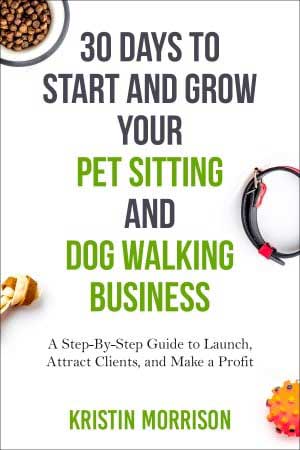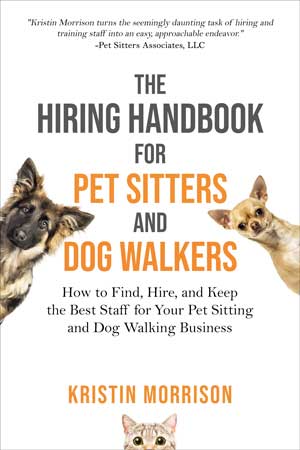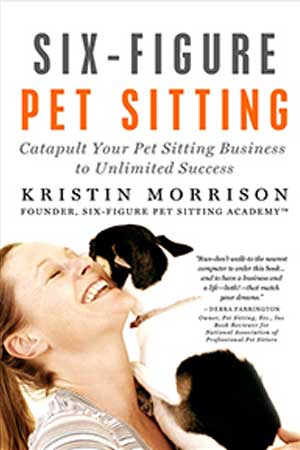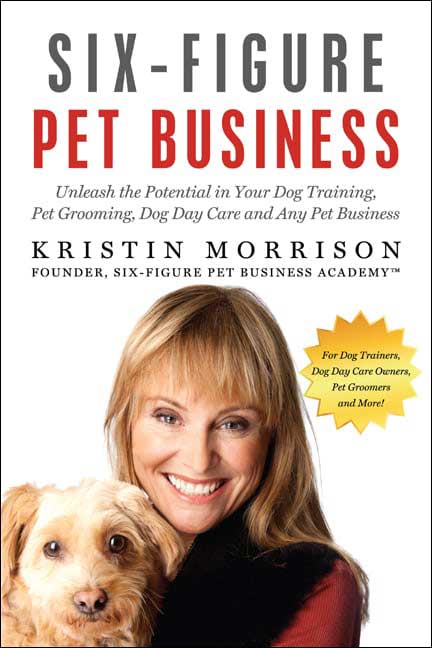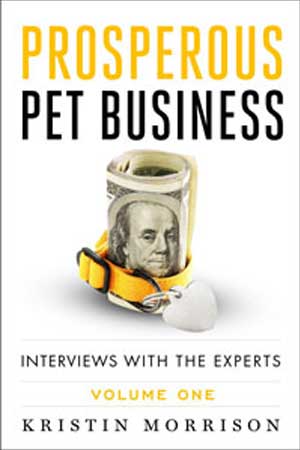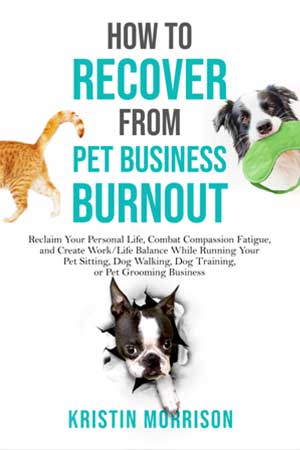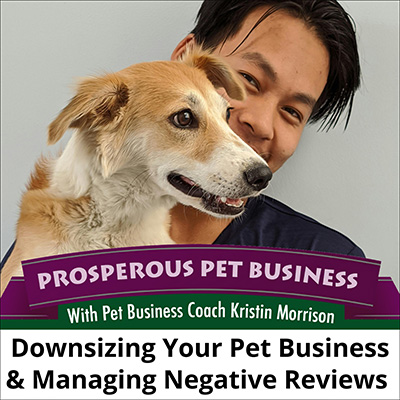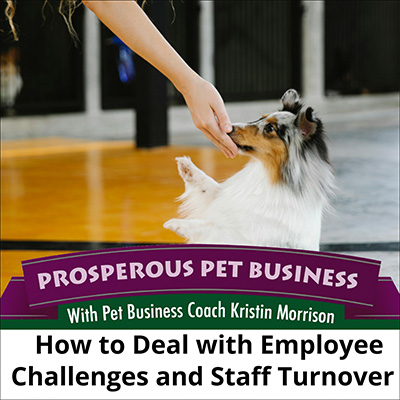Has your pet sitting, dog walking, dog training, pet grooming or dog daycare been affected by COVID-19?

I’ve received a lot of requests from my pet business coaching clients who live in the United States with questions about how they can best navigate the unemployment and/or forgivable loan process.
Please note that though I’ve been a pet business coach since 2000 (for 20 years now), I am not a certified financial planner/advisor, a financial analyst, or an economist, CPA, lawyer or accountant. I am a pet business coach who has done some research to understand what this act means to businesses.
Below, you’ll find a quick overview of how the benefits of the CARES Act may apply to your pet business. I am sharing a few key highlights and links in this post specifically related to how you might choose to deal with short-term cash flow.
Please note: I highly recommend that you connect with your financial advisor to review all the options available to you and to determine the right decision for your pet business needs.
What does the CARES Act provide for service-based pet businesses and solopreneurs?
Here is a quick overview:
1. Money for Americans Now
Here is a quick overview of several of the key components:
This provision will deliver a check of $1,200 per individual and $500 per child. All Americans including those with no income are eligible. If you are a high-income earner, the amount of your direct deposit or check reduces following a complicated formula.
The reduction begins at:
$75,000 for individuals
$112,500 for head of household
$150,000 for married couples
Here’s the bottom line: This rebate gradually drops to zero for incomes exceeding $99,000 per year for individuals, $146,500 for the head of household filers, and $198,000 for joint filers.
2. Unemployment for Independent Contractors
If you are an independent contractor or self-employed, you qualify for unemployment under this act. To apply for unemployment, you’ll want to search for the Employment Development Department in your particular state. For example, if you live and work in California, you’ll want to apply for California unemployment here.
3. Loans Available for Small Business Owners
Two Different Types of Loans Are Available
The CARES Act has provisions for two different types of loans: a Paycheck Protection Program with Loan Forgiveness and Economy Injury Disaster Loans. Below is a description of each of these loans, followed by a checklist of what to do to apply for either.
Loan Type #1: Payroll Protection Program with Loan Forgiveness for Small Businesses
The CARES Act includes a new Paycheck Protection Program that may forgive part of your loan.
You can access low-interest federal disaster loans if your business has suffered economic harm as a result of the coronavirus.
Key things to know:
- You can access a forgivable loan at an amount equal to 2.5 times average monthly payments of payroll, mortgage payments, rent, and other specific debt over the last one year period (up to $10 million).
- You can use the loan for payroll support (including paid sick or medical leave and independent contractors), employee salaries, mortgage payments, insurance premiums, and interest on any other debt incurred before February 15, 2020.
- The interest rate is .5%.
Does the COVID-19 Forgivable Disaster Loan Apply to My Pet Business?
You can potentially qualify for a loan if:
- You own a small business, any business concern, a non-profit, or veteran organization with fewer than 500 employees.
- You are a sole proprietor, independent contractor, or self-employed (with some limitations).
You can use these loans for certain fixed debts, payroll, accounts payable, and additional bills that you are unable to pay because of COVID-19’s impact.
The loan terms will extend up to 10 years.
What Portions of the COVID-19 Forgivable Disaster Loan May Be Forgiven?
You will be eligible for loan forgiveness equal to the amount you spend during the 8-week period after you originate the loan.
The items that qualify for forgiveness include:
- Payroll costs (up to 8 weeks of average payroll).
- Interest payment on any mortgage incurred after February 15, 2020.
- Payment of any rent on any lease in force prior to February 15, 2020.
- Payment on any utility for which service began before February 15, 2020.
Essentially, what you spend on these items may be forgiven and you will not be required to pay that portion of the loan back.
Again, check with your financial advisor for clarity on the best option for your specific business and economic circumstances. There are many factors that will determine which is the better option for you.
Here are some other important items to be aware of to help you determine which portion of the loan may be forgiven:
- Amounts forgiven may not exceed the principal amount of your loan.
- Your eligible payroll costs do not include compensation to any employee above $100,000 in wages.
- If you reduce your number of employees, the amount forgiven will be reduced proportionally.
- If you reduce the compensation of employees, the amount forgiven will also be reduced.
Lending criteria:Lender shall only consider your application if you were in operation 3/1/2020 and paid salaries and payroll taxes to employees.
Payment deferral: Payments can be deferred up to one year.
To apply: You will be able to apply online through banks that service SBA loans
Be wary of sharing financial information on sites or through emails soliciting you. You can apply directly on your bank website after applications open (contact your bank to determine that application date).
Loan Type #2: Economic Injury Disaster Loan
These loans are available to small businesses with less than 500 employees. Processing time is expected to be 14 to 20 days.
You may be eligible for 4 times average monthly payments of payroll, mortgage payments, rent, and other debt over the last one year period up to $10 million dollars.
The interest rate is 3.75% with terms up to 30 years.
You can use this to fund payroll, sick leave, medical or family leave, health insurance, mortgage payments, rent, utilities, and any other debt incurred before the loan.
Payments can be deferred up to one year.
As part of the Economic Injury Disaster Loan Program, there is an opportunity to receive a $10,000 grant to fund business expenses. These grants can be issued quickly.
5 Steps to Apply for Economic Injury Disaster Loan
If your business has been impacted by COVID-19, these steps will help guide you through accessing funds to support your business in the coming months.
STEP 1: Go to the SBA Website.
You can access the site here: https://covid19relief.sba.gov/
STEP 2: Verify Eligibility.
You will certify that you qualify and are not engaged in certain disqualifying activities.
STEP 3: Provide Business Information.
- Your legal and trade names of your business.
- Your federal EIN number of Social Security number.
- Gross revenue and cost of goods sold for the 12 months leading up to January 31, 2020.
- The date your business was founded.
- The number of employees.
STEP 4: Provide Owner Information.
- Percentage of business ownership.
- Home address
- Phone number
- Social Security number
- Date and place of birth
- Citizenship status
You can find more information on the US Chamber of Commerce site. There is also the option to apply for a $10,000 grant.
Remember to be patient for answers and loan approval – all sources of funding are experiencing a high volume of traffic. I wish you all the best.
We will get through this, together. Hang in in there!


About the Author:
Kristin Morrison started her pet sitting and dog walking company in the mid-90s and it grew to become one of the largest pet care companies in California. Kristin hired over 250 people in the course of running her business for 18 years and when she sold the business, she had 35 dog walkers and pet sitters and 4 managers on staff.
Kristin is the founder of Six-Figure Pet Sitting Academy™ and Six-Figure Pet Business Academy™ which provides coaching, webinars and business products to pet sitters, dog walkers, dog trainers, and pet groomers across the United States, Canada, the UK and Australia.
Kristin is also the host of the Prosperous Pet Business podcast which is found on iTunes, Spotify, Stitcher or wherever you listen to podcasts. You can also listen to it on the Prosperous Pet Business website.
Kristin is the author of five books: Six-Figure Pet Sitting, 30 Days to Start and Grow Your Pet Sitting and Dog Walking Business, The Hiring Handbook for Pet Sitters and Dog Walkers, Prosperous Pet Business and Six-Figure Pet Business. Her books are available in paperback on Amazon. The eBooks and audiobooks are on her website at: www.SixFigurePetBusinessAcademy.com
Social Media:
Facebook: https://www.facebook.com/SixFigurePetBusinessAcademy/
Join the Prosperous Pet Business Community Facebook Group: https://www.facebook.com/groups/prosperouspetbusiness/
Instagram: https://www.instagram.com/petbizcoach/
Twitter: https://twitter.com/petbizcoach
LinkedIn: https://www.linkedin.com/in/SixFigurePetSitting
Podcast:
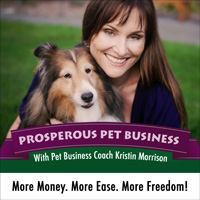
Prosperous Pet Business Podcast: https://prosperouspetbusiness.com/pet-business-podcast/
